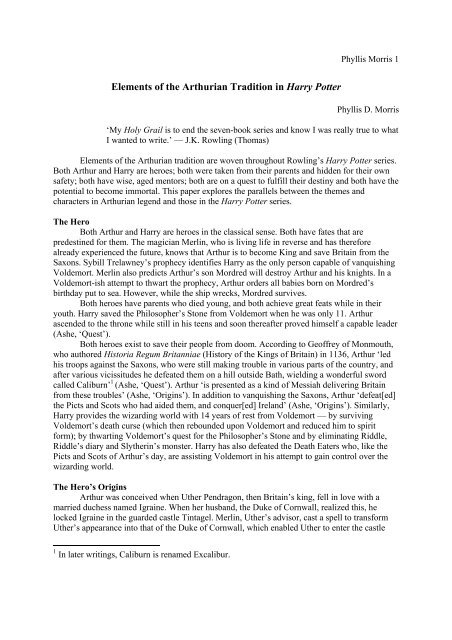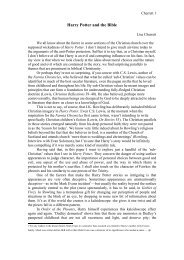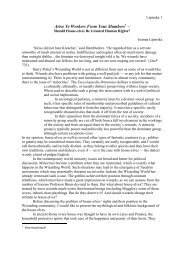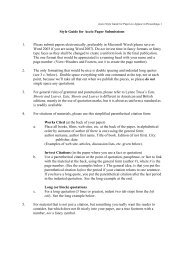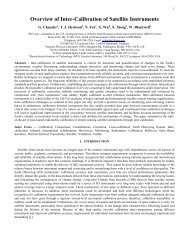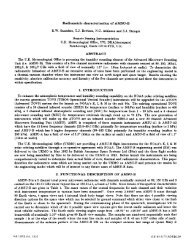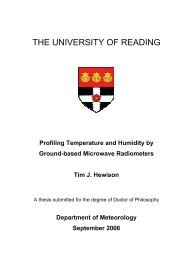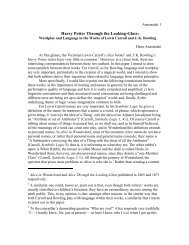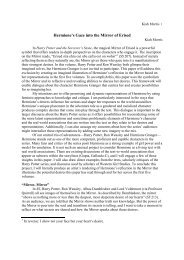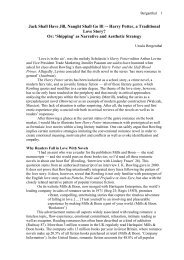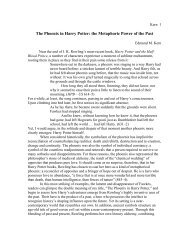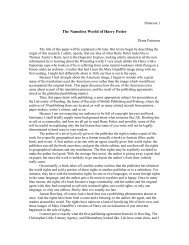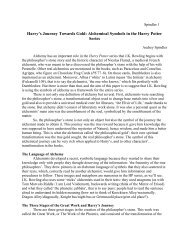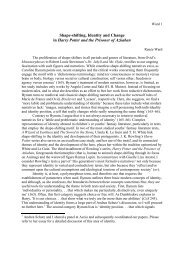Elements of the Arthurian Tradition in Harry Potter
Elements of the Arthurian Tradition in Harry Potter
Elements of the Arthurian Tradition in Harry Potter
You also want an ePaper? Increase the reach of your titles
YUMPU automatically turns print PDFs into web optimized ePapers that Google loves.
Phyllis Morris 1<br />
<strong>Elements</strong> <strong>of</strong> <strong>the</strong> <strong>Arthurian</strong> <strong>Tradition</strong> <strong>in</strong> <strong>Harry</strong> <strong>Potter</strong><br />
Phyllis D. Morris<br />
‘My Holy Grail is to end <strong>the</strong> seven-book series and know I was really true to what<br />
I wanted to write.’ — J.K. Rowl<strong>in</strong>g (Thomas)<br />
<strong>Elements</strong> <strong>of</strong> <strong>the</strong> <strong>Arthurian</strong> tradition are woven throughout Rowl<strong>in</strong>g’s <strong>Harry</strong> <strong>Potter</strong> series.<br />
Both Arthur and <strong>Harry</strong> are heroes; both were taken from <strong>the</strong>ir parents and hidden for <strong>the</strong>ir own<br />
safety; both have wise, aged mentors; both are on a quest to fulfill <strong>the</strong>ir dest<strong>in</strong>y and both have <strong>the</strong><br />
potential to become immortal. This paper explores <strong>the</strong> parallels between <strong>the</strong> <strong>the</strong>mes and<br />
characters <strong>in</strong> <strong>Arthurian</strong> legend and those <strong>in</strong> <strong>the</strong> <strong>Harry</strong> <strong>Potter</strong> series.<br />
The Hero<br />
Both Arthur and <strong>Harry</strong> are heroes <strong>in</strong> <strong>the</strong> classical sense. Both have fates that are<br />
predest<strong>in</strong>ed for <strong>the</strong>m. The magician Merl<strong>in</strong>, who is liv<strong>in</strong>g life <strong>in</strong> reverse and has <strong>the</strong>refore<br />
already experienced <strong>the</strong> future, knows that Arthur is to become K<strong>in</strong>g and save Brita<strong>in</strong> from <strong>the</strong><br />
Saxons. Sybill Trelawney’s prophecy identifies <strong>Harry</strong> as <strong>the</strong> only person capable <strong>of</strong> vanquish<strong>in</strong>g<br />
Voldemort. Merl<strong>in</strong> also predicts Arthur’s son Mordred will destroy Arthur and his knights. In a<br />
Voldemort-ish attempt to thwart <strong>the</strong> prophecy, Arthur orders all babies born on Mordred’s<br />
birthday put to sea. However, while <strong>the</strong> ship wrecks, Mordred survives.<br />
Both heroes have parents who died young, and both achieve great feats while <strong>in</strong> <strong>the</strong>ir<br />
youth. <strong>Harry</strong> saved <strong>the</strong> Philosopher’s Stone from Voldemort when he was only 11. Arthur<br />
ascended to <strong>the</strong> throne while still <strong>in</strong> his teens and soon <strong>the</strong>reafter proved himself a capable leader<br />
(Ashe, ‘Quest’).<br />
Both heroes exist to save <strong>the</strong>ir people from doom. Accord<strong>in</strong>g to Ge<strong>of</strong>frey <strong>of</strong> Monmouth,<br />
who authored Historia Regum Britanniae (History <strong>of</strong> <strong>the</strong> K<strong>in</strong>gs <strong>of</strong> Brita<strong>in</strong>) <strong>in</strong> 1136, Arthur ‘led<br />
his troops aga<strong>in</strong>st <strong>the</strong> Saxons, who were still mak<strong>in</strong>g trouble <strong>in</strong> various parts <strong>of</strong> <strong>the</strong> country, and<br />
after various vicissitudes he defeated <strong>the</strong>m on a hill outside Bath, wield<strong>in</strong>g a wonderful sword<br />
called Caliburn’ 1 (Ashe, ‘Quest’). Arthur ‘is presented as a k<strong>in</strong>d <strong>of</strong> Messiah deliver<strong>in</strong>g Brita<strong>in</strong><br />
from <strong>the</strong>se troubles’ (Ashe, ‘Orig<strong>in</strong>s’). In addition to vanquish<strong>in</strong>g <strong>the</strong> Saxons, Arthur ‘defeat[ed]<br />
<strong>the</strong> Picts and Scots who had aided <strong>the</strong>m, and conquer[ed] Ireland’ (Ashe, ‘Orig<strong>in</strong>s’). Similarly,<br />
<strong>Harry</strong> provides <strong>the</strong> wizard<strong>in</strong>g world with 14 years <strong>of</strong> rest from Voldemort — by surviv<strong>in</strong>g<br />
Voldemort’s death curse (which <strong>the</strong>n rebounded upon Voldemort and reduced him to spirit<br />
form); by thwart<strong>in</strong>g Voldemort’s quest for <strong>the</strong> Philosopher’s Stone and by elim<strong>in</strong>at<strong>in</strong>g Riddle,<br />
Riddle’s diary and Sly<strong>the</strong>r<strong>in</strong>’s monster. <strong>Harry</strong> has also defeated <strong>the</strong> Death Eaters who, like <strong>the</strong><br />
Picts and Scots <strong>of</strong> Arthur’s day, are assist<strong>in</strong>g Voldemort <strong>in</strong> his attempt to ga<strong>in</strong> control over <strong>the</strong><br />
wizard<strong>in</strong>g world.<br />
The Hero’s Orig<strong>in</strong>s<br />
Arthur was conceived when U<strong>the</strong>r Pendragon, <strong>the</strong>n Brita<strong>in</strong>’s k<strong>in</strong>g, fell <strong>in</strong> love with a<br />
married duchess named Igra<strong>in</strong>e. When her husband, <strong>the</strong> Duke <strong>of</strong> Cornwall, realized this, he<br />
locked Igra<strong>in</strong>e <strong>in</strong> <strong>the</strong> guarded castle T<strong>in</strong>tagel. Merl<strong>in</strong>, U<strong>the</strong>r’s advisor, cast a spell to transform<br />
U<strong>the</strong>r’s appearance <strong>in</strong>to that <strong>of</strong> <strong>the</strong> Duke <strong>of</strong> Cornwall, which enabled U<strong>the</strong>r to enter <strong>the</strong> castle<br />
1 In later writ<strong>in</strong>gs, Caliburn is renamed Excalibur.
Phyllis Morris 2<br />
after <strong>the</strong> Duke’s demise. ‘That night, Arthur, <strong>the</strong> heir to U<strong>the</strong>r’s throne and <strong>the</strong> future k<strong>in</strong>g <strong>of</strong><br />
Brita<strong>in</strong>, was conceived’ (Kronzek and Kronzek 165). However, <strong>in</strong> return for Merl<strong>in</strong>’s spell,<br />
U<strong>the</strong>r promises Merl<strong>in</strong> his first-born son, Arthur (Lopez).<br />
Because Merl<strong>in</strong> knows that Arthur is <strong>in</strong> danger, he hides him with a knight named Sir<br />
Ector and his wife (Colbert 188). Similarly, Dumbledore knows that <strong>Harry</strong> is <strong>in</strong> danger and hides<br />
him with <strong>the</strong> Dursleys. Both Arthur and <strong>Harry</strong>, are <strong>the</strong>refore, brought up <strong>in</strong> ignorance <strong>of</strong> <strong>the</strong>ir<br />
true parentage. However, while both boys know <strong>the</strong>y are parentless and <strong>the</strong>refore different,<br />
Arthur’s home life is very different than <strong>Harry</strong>’s. Arthur is loved and wanted, while <strong>the</strong> Dursleys<br />
take every available opportunity to rem<strong>in</strong>d <strong>Harry</strong> that he is unloved and unwanted (White 33).<br />
The Mentor and Guide<br />
The parallels between Dumbledore and Merl<strong>in</strong> do not end with <strong>the</strong> protection <strong>of</strong> <strong>the</strong> hero<br />
<strong>in</strong> danger, however. In addition to both characters sport<strong>in</strong>g long, flow<strong>in</strong>g beards (and blue eyes,<br />
accord<strong>in</strong>g to T.H. White), Merl<strong>in</strong> was K<strong>in</strong>g Arthur’s mentor and guide, as Dumbledore has been<br />
<strong>Harry</strong>’s guide and mentor (Colbert 188). To protect Arthur, Merl<strong>in</strong> took <strong>the</strong> k<strong>in</strong>g to a magical<br />
lake where <strong>the</strong> Lady <strong>of</strong> <strong>the</strong> Lake (known as Nimue) gave Arthur Excalibur, a sword with an<br />
unbreakable blade and a protective scabbard (Ford, ‘Orig<strong>in</strong>s’). Similarly, Dumbledore sends<br />
<strong>Harry</strong> <strong>the</strong> sword <strong>of</strong> Godric Gryff<strong>in</strong>dor when <strong>Harry</strong> is fac<strong>in</strong>g <strong>the</strong> Basilisk <strong>in</strong> <strong>the</strong> Chamber <strong>of</strong><br />
Secrets. <strong>Harry</strong> pulls <strong>the</strong> sword out <strong>of</strong> Gryff<strong>in</strong>dor’s hat (<strong>the</strong> Sort<strong>in</strong>g Hat) <strong>in</strong> a parallel to Arthur’s<br />
pull<strong>in</strong>g a sword from a stone to prove that he was <strong>the</strong> true k<strong>in</strong>g. This sword (which preceded<br />
Excalibur) was ‘drawn by Arthur as pro<strong>of</strong> <strong>of</strong> his birthright and <strong>of</strong> his nobility. It was both a test<br />
and a miraculous sign <strong>of</strong> his royalty’ (‘Sword <strong>in</strong> <strong>the</strong> Stone’). Both <strong>the</strong> scabbard <strong>of</strong> Arthur’s<br />
sword and <strong>the</strong> Sort<strong>in</strong>g Hat know <strong>the</strong> qualities necessary for an <strong>in</strong>dividual to be able to pull a<br />
sword from <strong>the</strong>ir depths. By pull<strong>in</strong>g Gryff<strong>in</strong>dor’s sword from <strong>the</strong> Hat, <strong>Harry</strong> proves that he is ‘a<br />
true Gryff<strong>in</strong>dor’ and puts to rest any l<strong>in</strong>ger<strong>in</strong>g doubts about whe<strong>the</strong>r he belongs <strong>in</strong> Sly<strong>the</strong>r<strong>in</strong><br />
house (CoS 245) .<br />
Merl<strong>in</strong> was <strong>the</strong> architect <strong>of</strong> <strong>the</strong> Round Table and was ‘closely <strong>in</strong>volved <strong>in</strong> aid<strong>in</strong>g and<br />
direct<strong>in</strong>g <strong>the</strong> events <strong>of</strong> <strong>the</strong> k<strong>in</strong>g and k<strong>in</strong>gdom <strong>of</strong> Camelot’ (‘Merl<strong>in</strong>’). Dumbledore was <strong>the</strong><br />
creator <strong>of</strong> <strong>the</strong> Order <strong>of</strong> <strong>the</strong> Phoenix and assisted and guided <strong>Harry</strong> on his quests. In addition,<br />
Merl<strong>in</strong> ‘was said to have <strong>the</strong> gift <strong>of</strong> transfiguration’ (Kronzek and Kronzek 167), so is it any<br />
wonder that Albus Dumbledore was <strong>the</strong> transfiguration teacher dur<strong>in</strong>g Riddle’s tenure at<br />
Hogwarts (CoS 230) or that he ‘did th<strong>in</strong>gs with a wand’ Pr<strong>of</strong>essor Marchbanks had ‘never seen<br />
before’ when she tested him for his Transfiguration NEWT (OotP 627)? In addition, both<br />
Dumbledore and Merl<strong>in</strong> are betrayed by those <strong>the</strong>y trusted. Merl<strong>in</strong> fell <strong>in</strong> love with Nimue, who<br />
<strong>the</strong>n played a trick on him and locked him <strong>in</strong> a cave that he was <strong>in</strong>capable <strong>of</strong> leav<strong>in</strong>g. Similarly,<br />
Snape murdered Dumbledore at <strong>the</strong> end <strong>of</strong> Book 6.<br />
Merl<strong>in</strong> also makes appearances <strong>in</strong> <strong>the</strong> <strong>Harry</strong> <strong>Potter</strong> series <strong>in</strong> more humorous ways — by<br />
be<strong>in</strong>g featured on Chocolate Frog cards (a mark <strong>of</strong> dist<strong>in</strong>ction he shares with Dumbledore); by<br />
hav<strong>in</strong>g his name used to connote honours (<strong>the</strong> different classes <strong>of</strong> <strong>the</strong> ‘Order <strong>of</strong> Merl<strong>in</strong>’ — not<br />
surpris<strong>in</strong>gly, Dumbledore’s Order <strong>of</strong> Merl<strong>in</strong> is First Class); and by hav<strong>in</strong>g his name used <strong>in</strong><br />
various expressions <strong>of</strong> surprise or disbelief (‘Merl<strong>in</strong>’s beard’).<br />
The Quest<br />
The myths and legends surround<strong>in</strong>g K<strong>in</strong>g Arthur centre on <strong>the</strong> quest for <strong>the</strong> Holy Grail.<br />
Accord<strong>in</strong>g to legend, K<strong>in</strong>g Arthur saw <strong>the</strong> Grail <strong>in</strong> a vision, and subsequently he and his knights<br />
attempted to f<strong>in</strong>d <strong>the</strong> Grail. Between c. 1160–90, Chretien de Troyes, a French medieval
Phyllis Morris 3<br />
romance writer, <strong>in</strong>troduced <strong>the</strong> Grail <strong>in</strong>to <strong>Arthurian</strong> literature. However, while ‘Chretien used <strong>the</strong><br />
grail as a symbol <strong>of</strong> beauty and mystery, he never presented it as an object <strong>of</strong> religious devotion.’<br />
The connection between <strong>the</strong> Holy Grail and <strong>the</strong> vessel used by Christ at <strong>the</strong> Last Supper that was<br />
<strong>the</strong>n used by St. Joseph <strong>of</strong> Arima<strong>the</strong>a to catch <strong>the</strong> blood <strong>of</strong> Christ while on <strong>the</strong> cross was made c.<br />
1210 by Robert de Boron. (Hampton and Ford)<br />
While <strong>the</strong> location <strong>of</strong> <strong>the</strong> Grail was forgotten over time, <strong>the</strong>re was a prophecy at <strong>the</strong> Court<br />
<strong>of</strong> K<strong>in</strong>g Arthur that <strong>the</strong> Grail would one day be rediscovered by a descendant <strong>of</strong> St. Joseph.<br />
Accord<strong>in</strong>g to <strong>the</strong> prophecy, <strong>the</strong> person who would f<strong>in</strong>d <strong>the</strong> Grail would be <strong>the</strong> person designated<br />
to sit <strong>in</strong> <strong>the</strong> Siege Perilous (Ford, ‘Holy Grail’). The Siege Perilous was <strong>the</strong> seat at <strong>the</strong> Round<br />
Table allegedly created by Merl<strong>in</strong> ‘<strong>in</strong> which none but <strong>the</strong> chosen Grail knight may sit without<br />
disastrous consequences […] When Galahad arrives at Camelot, his name appears on <strong>the</strong> seat<br />
dest<strong>in</strong>ed for him’ (‘The Siege Perilous’). Galahad is <strong>the</strong> grandson <strong>of</strong> K<strong>in</strong>g Pelles, a descendant <strong>of</strong><br />
Joseph <strong>of</strong> Arima<strong>the</strong>a and <strong>the</strong> fa<strong>the</strong>r <strong>of</strong> Ela<strong>in</strong>e, Galahad’s mo<strong>the</strong>r. After a series <strong>of</strong> unsuccessful<br />
attempts by o<strong>the</strong>r knights, Galahad arrives at <strong>the</strong> castle where <strong>the</strong> Grail was located, and ‘was<br />
permitted entry to <strong>the</strong> Grail Chapel and allowed to gaze upon <strong>the</strong> great cup. His life became<br />
complete and toge<strong>the</strong>r grail and man were lifted up to heaven’ (Ford, ‘Holy Grail’). Prior to his<br />
death, however, Galahad uses <strong>the</strong> power <strong>of</strong> <strong>the</strong> Grail to heal his grandfa<strong>the</strong>r <strong>of</strong> <strong>the</strong> ‘dolorous<br />
stroke’ <strong>in</strong>flicted by Bal<strong>in</strong>’s sword many years earlier.<br />
Each one <strong>of</strong> <strong>the</strong> six <strong>Harry</strong> <strong>Potter</strong> books written thus far <strong>in</strong>volves quests. In <strong>Harry</strong> <strong>Potter</strong><br />
and <strong>the</strong> Philosopher’s Stone, Voldemort is on a quest to f<strong>in</strong>d <strong>the</strong> Philosopher’s Stone to achieve<br />
immortality. Voldemort’s quest becomes <strong>Harry</strong>’s quest, as <strong>Harry</strong> believes himself to be <strong>the</strong> only<br />
one capable <strong>of</strong> stopp<strong>in</strong>g Voldemort from obta<strong>in</strong><strong>in</strong>g <strong>the</strong> Stone once he learns that Dumbledore has<br />
left Hogwarts. The quest takes <strong>Harry</strong> through a series <strong>of</strong> obstacles, and while he is accompanied<br />
at first by Ron and Hermione, it is he alone — like Galahad — who must complete <strong>the</strong> quest and<br />
save <strong>the</strong> Stone from Voldemort. Interest<strong>in</strong>gly, Wolfram von Eschenbach’s Parzival ‘presents <strong>the</strong><br />
Grail as a stone which provides sustenance and prevents anyone who beholds it from dy<strong>in</strong>g<br />
with<strong>in</strong> <strong>the</strong> week’ (‘The Holy Grail’). The portrayal <strong>of</strong> <strong>the</strong> Grail as a stone that prevents death is<br />
very similar to Rowl<strong>in</strong>g’s portrayal <strong>of</strong> <strong>the</strong> Philosopher’s Stone as <strong>the</strong> means <strong>of</strong> mak<strong>in</strong>g an elixir<br />
that assures immortality.<br />
Philosopher’s Stone actually tells us about two quests — <strong>the</strong> quest for <strong>the</strong> Stone, as well<br />
as Voldemort’s quest to kill <strong>the</strong> boy who has been prophesied to be <strong>the</strong> only one who can be his<br />
undo<strong>in</strong>g. As Galahad’s seat is marked with his name, signify<strong>in</strong>g that he is <strong>the</strong> only one who can<br />
f<strong>in</strong>d <strong>the</strong> Grail, Voldemort’s attack on <strong>Harry</strong> as a baby leaves him marked with <strong>the</strong> scar that<br />
signifies <strong>Harry</strong> as Voldemort’s equal and as <strong>the</strong> only one who can vanquish Voldemort.<br />
In <strong>Harry</strong> <strong>Potter</strong> and <strong>the</strong> Chamber <strong>of</strong> Secrets, <strong>Harry</strong>’s quest is to f<strong>in</strong>d <strong>the</strong> elusive Chamber<br />
<strong>of</strong> Secrets to stop Sly<strong>the</strong>r<strong>in</strong>’s monster from attack<strong>in</strong>g Muggle-born Hogwarts students. But<br />
perhaps more important, <strong>Harry</strong> is seek<strong>in</strong>g to discover his heritage — particularly, whe<strong>the</strong>r he is<br />
<strong>in</strong> fact a descendant <strong>of</strong> Sly<strong>the</strong>r<strong>in</strong>. In <strong>Harry</strong> <strong>Potter</strong> and <strong>the</strong> Prisoner <strong>of</strong> Azkaban, <strong>Harry</strong> seeks to<br />
discover how to repel Dementors. Through <strong>the</strong> process <strong>of</strong> learn<strong>in</strong>g <strong>the</strong> Patronus Charm, he<br />
discovers that happ<strong>in</strong>ess is <strong>the</strong> solution to fear. As Book 3 progresses, <strong>Harry</strong> f<strong>in</strong>ds his fa<strong>the</strong>r <strong>in</strong><br />
himself, saves his godfa<strong>the</strong>r and sends Voldemort a Death Eater who is <strong>in</strong> his debt. In <strong>Harry</strong><br />
<strong>Potter</strong> and <strong>the</strong> Order <strong>of</strong> <strong>the</strong> Phoenix, <strong>Harry</strong> strives to understand <strong>the</strong> significance <strong>of</strong> <strong>the</strong> black<br />
door that keeps reappear<strong>in</strong>g <strong>in</strong> his dreams and, without know<strong>in</strong>g it, is on a quest to discover <strong>the</strong><br />
prophecy. With Half-Blood Pr<strong>in</strong>ce, <strong>Harry</strong> now knows that he alone (with, perhaps, a little help<br />
from Ron and Hermione) must f<strong>in</strong>d and destroy <strong>the</strong> rema<strong>in</strong>der <strong>of</strong> Voldemort’s horcruxes and,<br />
ultimately, <strong>the</strong> entirety <strong>of</strong> Voldemort himself.
Phyllis Morris 4<br />
The most obvious Grail imagery appears <strong>in</strong> <strong>Harry</strong> <strong>Potter</strong> and <strong>the</strong> Goblet <strong>of</strong> Fire. Malory<br />
describes <strong>the</strong> Grail as be<strong>in</strong>g housed <strong>in</strong> a ‘chest <strong>of</strong> gold and precious stones’ (746), which is<br />
rem<strong>in</strong>iscent <strong>of</strong> <strong>the</strong> ‘casket’ <strong>in</strong> which <strong>the</strong> Goblet <strong>of</strong> Fire arrives. In addition, as David Colbert,<br />
author <strong>of</strong> The Magical Worlds <strong>of</strong> <strong>Harry</strong> <strong>Potter</strong>, expla<strong>in</strong>s:<br />
The Goblet <strong>of</strong> Fire is more than a little similar to ano<strong>the</strong>r powerful goblet that has<br />
launched tournaments and battles: <strong>the</strong> Holy Grail […] Though sometimes<br />
depicted as a sh<strong>in</strong><strong>in</strong>g silver goblet, <strong>the</strong> Holy Grail, be<strong>in</strong>g <strong>the</strong> cup <strong>of</strong> a poor<br />
carpenter, would probably have been made <strong>of</strong> wood — like <strong>the</strong> Goblet <strong>of</strong> Fire.<br />
The Grail is also a magical object. To dr<strong>in</strong>k from it is to be miraculously healed.<br />
And like <strong>the</strong> Goblet, it can sense whe<strong>the</strong>r or not a person is worthy. (85–86)<br />
Each <strong>of</strong> <strong>the</strong> tasks <strong>in</strong> <strong>the</strong> Triwizard Tournament represents a microcosm <strong>of</strong> <strong>the</strong> quest. In<br />
<strong>the</strong> First Task, <strong>Harry</strong> must fight a dragon to retrieve <strong>the</strong> golden egg (notably, dragons are also<br />
featured prom<strong>in</strong>ently <strong>in</strong> <strong>Arthurian</strong> legend). In <strong>the</strong> Second Task, <strong>Harry</strong> must brave gr<strong>in</strong>dylows and<br />
merpeople to rescue Ron from <strong>the</strong> depths <strong>of</strong> <strong>the</strong> lake (and displays <strong>the</strong> chivalry <strong>of</strong> K<strong>in</strong>g Arthur<br />
and his knights <strong>in</strong> rescu<strong>in</strong>g Fleur’s sister unnecessarily). In <strong>the</strong> Third Task, <strong>Harry</strong> must get past<br />
acromantulas, blast-ended skrewts, a boggart and a sph<strong>in</strong>x ‘to literally f<strong>in</strong>d a Grail, <strong>in</strong> this case<br />
<strong>the</strong> Triwizard Cup, and to w<strong>in</strong> it for Hogwarts’ (Colbert 86).<br />
As <strong>in</strong> <strong>Arthurian</strong> legend, <strong>Harry</strong> is not <strong>the</strong> only one who embarks on quests through <strong>the</strong><br />
<strong>Harry</strong> <strong>Potter</strong> series. In Philosopher’s Stone, Voldemort uses Quirrell to try to f<strong>in</strong>d <strong>the</strong> Stone. The<br />
entire Hogwarts teach<strong>in</strong>g staff (with <strong>the</strong> one notable exception <strong>of</strong> Pr<strong>of</strong>essor Lockhart) is look<strong>in</strong>g<br />
for <strong>the</strong> Chamber <strong>of</strong> Secrets <strong>in</strong> Book 2. The Dementors are search<strong>in</strong>g for Sirius Black <strong>in</strong> Prisoner<br />
<strong>of</strong> Azkaban. The o<strong>the</strong>r contestants <strong>in</strong> <strong>the</strong> Triwizard Tournament, like Knights <strong>of</strong> <strong>the</strong> Round<br />
Table, are also on quests as <strong>the</strong>y complete each Tournament task <strong>in</strong> Goblet <strong>of</strong> Fire. At <strong>the</strong> Yule<br />
Ball, <strong>the</strong> contestants and <strong>the</strong> judges even sit at “a large round table at <strong>the</strong> top <strong>of</strong> <strong>the</strong> Hall” 2 (GoF<br />
361). In Order <strong>of</strong> <strong>the</strong> Phoenix, Voldemort is on a quest to obta<strong>in</strong> <strong>the</strong> prophecy and rega<strong>in</strong> his<br />
power.<br />
The <strong>Harry</strong> <strong>Potter</strong> books diverge from <strong>Arthurian</strong> tradition, however, <strong>in</strong> that it is <strong>the</strong> villa<strong>in</strong>,<br />
ra<strong>the</strong>r than <strong>the</strong> hero, who <strong>in</strong>itiates <strong>the</strong> majority <strong>of</strong> <strong>the</strong> quests <strong>in</strong> <strong>the</strong> series. Moreover, while <strong>the</strong><br />
villa<strong>in</strong>’s quests appear to succeed <strong>in</strong>itially, <strong>the</strong>y tend to backfire on Voldemort <strong>in</strong> <strong>the</strong> end:<br />
Voldemort attacks <strong>Harry</strong> as a baby, only to have <strong>the</strong> curse rebound and turn him <strong>in</strong>to a bodiless<br />
spirit, as well as fulfill<strong>in</strong>g <strong>the</strong> terms <strong>of</strong> <strong>the</strong> prophecy by mark<strong>in</strong>g <strong>Harry</strong> ‘as his equal’ (OotP 741);<br />
while Voldemort’s past self successfully lures <strong>Harry</strong> to <strong>the</strong> Chamber <strong>of</strong> Secrets, <strong>Harry</strong> w<strong>in</strong>ds up<br />
kill<strong>in</strong>g <strong>the</strong> Basilisk and destroy<strong>in</strong>g Riddle’s diary (thus prevent<strong>in</strong>g Voldemort from ever<br />
return<strong>in</strong>g aga<strong>in</strong> via that mechanism and, while not realiz<strong>in</strong>g it at <strong>the</strong> time, destroy<strong>in</strong>g one <strong>of</strong><br />
Voldemort’s horcruxes); Voldemort succeeds <strong>in</strong> his scheme to enter <strong>Harry</strong>’s name <strong>in</strong>to <strong>the</strong><br />
Goblet <strong>of</strong> Fire and to have <strong>Harry</strong> be <strong>the</strong> first to reach <strong>the</strong> Triwizard Cup, but fails to kill <strong>Harry</strong> <strong>in</strong><br />
<strong>the</strong> graveyard, leav<strong>in</strong>g himself vulnerable to ‘<strong>the</strong> one with <strong>the</strong> power to vanquish’ him (741) and<br />
expos<strong>in</strong>g Barty Crouch, Jr. as an imposter; and Voldemort lures <strong>Harry</strong> to <strong>the</strong> Department <strong>of</strong><br />
Mysteries only to have <strong>the</strong> prophecy destroyed before he can hear its contents.<br />
The <strong>in</strong>dividual responsible for quest <strong>in</strong>itiation changes <strong>in</strong> Half-Blood Pr<strong>in</strong>ce, however —<br />
<strong>Harry</strong> is now <strong>in</strong> control <strong>of</strong> direct<strong>in</strong>g <strong>the</strong> quest for <strong>the</strong> miss<strong>in</strong>g horcruxes and <strong>the</strong> ultimate<br />
destruction <strong>of</strong> Voldemort <strong>in</strong> his entirety. Dumbledore makes it clear to <strong>Harry</strong> that it is <strong>Harry</strong>’s<br />
choice to vanquish Voldemort, that this is not someth<strong>in</strong>g <strong>Harry</strong> is be<strong>in</strong>g forced to do: ‘…you are<br />
free to choose your way, quite free to turn your back on <strong>the</strong> prophecy!’ (HBP 479). This<br />
2 My emphasis.
Phyllis Morris 5<br />
underscores <strong>the</strong> importance <strong>of</strong> choice that was first highlighted <strong>in</strong> Chamber <strong>of</strong> Secrets when<br />
Pr<strong>of</strong>essor Dumbledore told <strong>Harry</strong> ‘It is our choices … that show what we truly are’ (245).<br />
Characters and Cards<br />
Morgana jo<strong>in</strong>s Merl<strong>in</strong> <strong>in</strong> <strong>the</strong> category <strong>of</strong> characters from <strong>Arthurian</strong> legend who are<br />
featured on <strong>the</strong> Chocolate Frog cards. In addition, four <strong>Harry</strong> <strong>Potter</strong> characters bear names that<br />
are associated with <strong>the</strong> <strong>Arthurian</strong> tradition: Percy Weasley, Albus Percival Wulfric Brian<br />
Dumbledore, Lucius Malfoy and Arthur Weasley.<br />
Morgana/Morgan Le Fay<br />
Morgana is one <strong>of</strong> <strong>the</strong> Chocolate Frog cards <strong>Harry</strong> discovers on his first trip on <strong>the</strong><br />
Hogwarts Express. Morgana is a fictional character who was <strong>in</strong>troduced <strong>in</strong>to <strong>Arthurian</strong> legend by<br />
Ge<strong>of</strong>frey <strong>of</strong> Monmouth, who renamed her ‘Morgan le Fay,’ which means ‘Morgan <strong>the</strong> Fairy’<br />
(Kronzek and Kronzek 172). In Sir Thomas Malory’s Le Morte d’Arthur, Morgan le Fay is<br />
‘Arthur’s half sister, <strong>the</strong> daughter <strong>of</strong> Arthur’s mo<strong>the</strong>r Igra<strong>in</strong>e and her first husband, <strong>the</strong> Duke <strong>of</strong><br />
Cornwall’ (‘Morgan le Fay’). While Ge<strong>of</strong>frey’s Morgan le Fay heals Arthur when he is brought<br />
to <strong>the</strong> Isle <strong>of</strong> Avalon with a near-fatal wound, Malory portrays Morgan negatively, hold<strong>in</strong>g her<br />
responsible for steal<strong>in</strong>g Arthur’s sword Excalibur so that his enemy (a knight named Accolon)<br />
can use it aga<strong>in</strong>st him and <strong>the</strong>n throw<strong>in</strong>g <strong>the</strong> scabbard <strong>of</strong> Excalibur, which protects Arthur, <strong>in</strong>to a<br />
lake.<br />
Percy Weasley and Albus Percival Wulfric Brian Dumbledore<br />
Most <strong>of</strong> <strong>the</strong> <strong>Arthurian</strong> legends focus on a character named Percivale. ‘Born <strong>in</strong>to a peasant<br />
family, Perceval eventually proves his virtue and becomes a Knight <strong>of</strong> <strong>the</strong> Round Table’ (Colbert<br />
86). Percivale is depicted differently depend<strong>in</strong>g on which version <strong>of</strong> events one reads. The first<br />
version describes Percivale as a fool who was <strong>the</strong> first to locate <strong>the</strong> Grail at <strong>the</strong> Great Castle <strong>of</strong><br />
Carbonek but does not ask <strong>the</strong> wounded K<strong>in</strong>g <strong>of</strong> Carbonek (K<strong>in</strong>g Pelles) about <strong>the</strong> Grail<br />
‘because he has been advised <strong>of</strong> <strong>the</strong> impoliteness <strong>of</strong> ask<strong>in</strong>g too many questions’ 3 (‘Perceval’). As<br />
a result, he does not realize that <strong>the</strong> Grail resides at <strong>the</strong> castle and that he can heal <strong>the</strong> K<strong>in</strong>g by<br />
obta<strong>in</strong><strong>in</strong>g <strong>the</strong> Grail. In <strong>the</strong> second version, Perceval le Gallois, which was left unf<strong>in</strong>ished by<br />
Chretien de Troyes and was cont<strong>in</strong>ued by Manessier (c. 1230), it is Percivale, not Galahad, who<br />
is dest<strong>in</strong>ed to f<strong>in</strong>d <strong>the</strong> Grail and who eventually becomes <strong>the</strong> keeper <strong>of</strong> <strong>the</strong> Grail and heals <strong>the</strong><br />
wounded K<strong>in</strong>g (Hampton and Ford).<br />
Percy Weasley is similarly born <strong>in</strong>to a ‘peasant family,’ as <strong>the</strong> Weasleys are a down-toearth<br />
family with limited f<strong>in</strong>ancial resources. As <strong>the</strong> Percivale <strong>of</strong> <strong>Arthurian</strong> legend is foolish, <strong>in</strong><br />
Goblet <strong>of</strong> Fire, Percy Weasley is portrayed as a fool who puts a high value on cauldron bottom<br />
thickness reports and displays unswerv<strong>in</strong>g loyalty to his boss, Mr. Crouch, even when Crouch<br />
shows that he barely recognizes his existence by call<strong>in</strong>g him ‘Wea<strong>the</strong>rby’ (GoF 83). Moreover,<br />
Percy attributes Crouch’s odd behaviour to ‘overwork’ <strong>in</strong>stead <strong>of</strong> realiz<strong>in</strong>g that Crouch is be<strong>in</strong>g<br />
controlled by <strong>the</strong> Imperius Curse. Percy Weasley’s foolishness <strong>in</strong>creases <strong>in</strong> Order <strong>of</strong> <strong>the</strong><br />
Phoenix, where he is shown as Cornelius Fudge’s lapdog whose eagerness to please is<br />
demonstrated by his will<strong>in</strong>gness to allow <strong>in</strong>k to splatter his nose while he hastily copies down<br />
Dumbledore’s ‘confession’. Even after <strong>the</strong> M<strong>in</strong>istry accepts Voldemort’s return <strong>in</strong> Half-Blood<br />
3 The Dursleys also discourage <strong>Harry</strong> from ask<strong>in</strong>g questions: “Don’t ask questions – that was <strong>the</strong><br />
first rule for a quiet life with <strong>the</strong> Dursleys” (PS 20).
Phyllis Morris 6<br />
Pr<strong>in</strong>ce, Percy rema<strong>in</strong>s estranged from his family and only visits <strong>the</strong>m when <strong>the</strong> M<strong>in</strong>ister needs an<br />
excuse to talk to <strong>Harry</strong>.<br />
In Malory’s Le Morte d’Arthur, Percivale’s mo<strong>the</strong>r dies <strong>of</strong> grief after he leaves her (660).<br />
Hopefully Percy’s estrangement from his family will not lead to such a tragic end for Molly<br />
Weasley, although her encounter with <strong>the</strong> boggart is a strong <strong>in</strong>dication <strong>of</strong> how upset she is about<br />
Percy’s departure. Malory also recounts how, when Percivale saw a lion and a serpent fight<strong>in</strong>g,<br />
Percivale came to <strong>the</strong> aid <strong>of</strong> <strong>the</strong> lion and slew <strong>the</strong> serpent with his sword. Hopefully, this is an<br />
<strong>in</strong>dication that Percy will rejo<strong>in</strong> <strong>the</strong> Gryff<strong>in</strong>dor lions <strong>in</strong> <strong>the</strong> fight aga<strong>in</strong>st <strong>the</strong> serpent-like<br />
Voldemort <strong>in</strong> Book 7.<br />
Percivale was mocked and scorned when he was knighted much <strong>in</strong> <strong>the</strong> same way Fred<br />
and George ridicule Percy for be<strong>in</strong>g named Head Boy <strong>in</strong> Book 3 (Malory 600–601). However,<br />
Percivale is one <strong>of</strong> <strong>the</strong> few who can see <strong>the</strong> Grail, because he is a ‘perfect man’, i.e., he is ‘clean<br />
<strong>of</strong> his s<strong>in</strong>s’ (602–3; 636). In Malory’s version, only Galahad, Launcelot, Bors and Percivale are<br />
able to achieve <strong>the</strong> quest for <strong>the</strong> Grail. The quest is <strong>the</strong> beg<strong>in</strong>n<strong>in</strong>g <strong>of</strong> <strong>the</strong> end for Percivale,<br />
however, as he survives for only one year and two months after <strong>the</strong> Grail is found.<br />
Dur<strong>in</strong>g <strong>Harry</strong>’s discipl<strong>in</strong>ary hear<strong>in</strong>g <strong>in</strong> Order <strong>of</strong> <strong>the</strong> Phoenix, we are provided with<br />
Dumbledore’s complete name for <strong>the</strong> first time, and learn that he had not one, but three middle<br />
names — Percival, Wulfric and Brian (OotP 127). Dumbledore was most ak<strong>in</strong> to <strong>the</strong> Percivale <strong>in</strong><br />
Perceval le Gallois, who became <strong>the</strong> keeper <strong>of</strong> <strong>the</strong> Holy Grail, as Dumbledore was not only <strong>the</strong><br />
keeper <strong>of</strong> <strong>the</strong> Grail-like Philosopher’s Stone <strong>in</strong> Book 1, but also possessed o<strong>the</strong>r magical objects,<br />
such as <strong>the</strong> Sort<strong>in</strong>g Hat and Godric Gryff<strong>in</strong>dor’s sword, which came to <strong>Harry</strong>’s aid dur<strong>in</strong>g his<br />
quest <strong>in</strong> Chamber <strong>of</strong> Secrets. In addition, Dumbledore owned Fawkes <strong>the</strong> phoenix, whose tears<br />
have heal<strong>in</strong>g powers. As Percivale used <strong>the</strong> power <strong>of</strong> <strong>the</strong> Grail to heal <strong>the</strong> wounded Grail K<strong>in</strong>g,<br />
Dumbledore sent his phoenix to heal <strong>Harry</strong> after he is wounded by <strong>the</strong> Basilisk <strong>in</strong> <strong>the</strong> Chamber.<br />
As Percivale died shortly after <strong>the</strong> Grail was achieved, Dumbledore died shortly after f<strong>in</strong>d<strong>in</strong>g<br />
some <strong>of</strong> <strong>the</strong> horcruxes.<br />
Arthur Weasley and Lucius Malfoy<br />
The Roman ruler Lucius attempted to extort money and lands from K<strong>in</strong>g Arthur. K<strong>in</strong>g<br />
Arthur refused to succumb, and defeated <strong>the</strong> Romans to conquer large parts <strong>of</strong> Gaul. K<strong>in</strong>g Arthur<br />
also killed Lucius <strong>in</strong> <strong>the</strong> process.<br />
In <strong>Harry</strong> <strong>Potter</strong>, <strong>the</strong>re are two characters who engage <strong>in</strong> battle, albeit not bedecked <strong>in</strong><br />
armour and astride horses — Arthur Weasley and Lucius Malfoy. In Chamber <strong>of</strong> Secrets, <strong>the</strong><br />
usually gentle Arthur Weasley uncharacteristically hurls himself at Lucius Malfoy when Lucius<br />
calls him ‘a disgrace to <strong>the</strong> name <strong>of</strong> wizard’ and mocks his association with Muggles (51).<br />
Dur<strong>in</strong>g that fight, Lucius Malfoy plants Riddle’s diary on G<strong>in</strong>ny Weasley <strong>in</strong> an attempt to<br />
discredit her fa<strong>the</strong>r. Arthur Weasley is also attacked by Voldemort’s snake, Nag<strong>in</strong>i, while Lucius<br />
Malfoy’s master, Voldemort, possesses her. While Arthur Weasley’s daughter w<strong>in</strong>ds up be<strong>in</strong>g<br />
possessed by Voldemort and Arthur himself suffers a ‘cut lip’ from <strong>the</strong> bookstore brawl (51) and<br />
grievous wounds from <strong>the</strong> snake, his nemesis Lucius gets his comeuppance when he is exposed<br />
publicly as a Death Eater and sent to Azkaban at <strong>the</strong> end <strong>of</strong> Order <strong>of</strong> <strong>the</strong> Phoenix.<br />
Dur<strong>in</strong>g <strong>Harry</strong>’s careers session, when Pr<strong>of</strong>essor Umbridge declares that <strong>Harry</strong> will never<br />
be accepted as an Auror by <strong>the</strong> M<strong>in</strong>istry <strong>of</strong> Magic, Pr<strong>of</strong>essor McGonagall proclaims, ‘“There<br />
may well be a new M<strong>in</strong>ister for Magic by <strong>the</strong> time <strong>Potter</strong> is ready to jo<strong>in</strong>!”’ (OotP 586). This<br />
may be an <strong>in</strong>dication that Arthur Weasley will succeed Scrimgeour as M<strong>in</strong>ister for Magic <strong>in</strong><br />
Book 7. Ron Weasley’s prediction <strong>in</strong> Order <strong>of</strong> <strong>the</strong> Phoenix that ‘We’ve got about as much
Phyllis Morris 7<br />
chance <strong>of</strong> w<strong>in</strong>n<strong>in</strong>g <strong>the</strong> Quidditch Cup this year as Dad’s got <strong>of</strong> becom<strong>in</strong>g M<strong>in</strong>ister for Magic’<br />
(575) could be a clue that Arthur Weasley will eventually take over <strong>the</strong> M<strong>in</strong>istry s<strong>in</strong>ce<br />
Gryff<strong>in</strong>dor actually wound up w<strong>in</strong>n<strong>in</strong>g <strong>the</strong> Quidditch Cup. Arthur Weasley’s ascension to<br />
M<strong>in</strong>ister for Magic would also parallel K<strong>in</strong>g Arthur’s coronation as emperor <strong>of</strong> Rome after<br />
Lucius’ death.<br />
Fur<strong>the</strong>r support for <strong>the</strong> Arthur-as-M<strong>in</strong>ister <strong>the</strong>ory is found <strong>in</strong> <strong>the</strong> numerous references to<br />
both red and purple, <strong>the</strong> royal colour, <strong>in</strong> connection with Arthur Weasley and members <strong>of</strong><br />
Arthur’s family. Red and purple are also significant colours <strong>in</strong> alchemy, which is ‘<strong>the</strong> study <strong>of</strong><br />
<strong>the</strong> transformative processes <strong>in</strong>volved <strong>in</strong> <strong>the</strong> perfection or evolution <strong>of</strong> matter’ (Bower). The last<br />
phase <strong>of</strong> <strong>the</strong> alchemical Great Work is ‘“<strong>the</strong> work <strong>of</strong> redden<strong>in</strong>g”, which alchemists orig<strong>in</strong>ally<br />
separated <strong>in</strong>to two complementary moments, that <strong>of</strong> gold (Citr<strong>in</strong>itas or Xantosis) and that <strong>of</strong><br />
purple or transmutation <strong>of</strong> venom (Iosis)’ (Aniane). Rowl<strong>in</strong>g’s books are full <strong>of</strong> alchemical<br />
imagery right from <strong>the</strong> start, with Dumbledore’s work on alchemy with Nicholas Flamel and <strong>the</strong><br />
focus on <strong>the</strong> Philosopher’s Stone.<br />
Most obviously, Arthur Weasley and all <strong>of</strong> his children have red hair. Ron’s socks,<br />
pyjamas and sweaters are almost always referred to as maroon, and I’ve lost track <strong>of</strong> <strong>the</strong> number<br />
<strong>of</strong> times his ears have turned red! In Goblet <strong>of</strong> Fire, Ron hands Dobby ‘a pair <strong>of</strong> violet socks he<br />
had just unwrapped’ 4 along with his annual maroon Christmas sweater (GoF 356). In addition,<br />
Mundungus Fletcher ‘rescu[es] Ron from an ancient set <strong>of</strong> purple robes …’ <strong>in</strong> Order <strong>of</strong> <strong>the</strong><br />
Phoenix (110). Mrs. Weasley is described as wear<strong>in</strong>g a ‘quilted purple dress<strong>in</strong>g gown’ a few<br />
pages later (112). Arthur Weasley’s assumption <strong>of</strong> <strong>the</strong> responsibility for protect<strong>in</strong>g <strong>the</strong> British<br />
wizard<strong>in</strong>g community would parallel K<strong>in</strong>g Arthur’s protection <strong>of</strong> Brita<strong>in</strong> <strong>in</strong> ancient times.<br />
Moreover, Arthur Weasley would be <strong>in</strong> a much better position to conv<strong>in</strong>ce <strong>Harry</strong> to jo<strong>in</strong> forces<br />
with <strong>the</strong> M<strong>in</strong>istry than <strong>the</strong> current M<strong>in</strong>ister for Magic, Rufus Scrimgeour.<br />
The Immortal Hero<br />
In <strong>the</strong> legend <strong>of</strong> K<strong>in</strong>g Arthur as described by both Malory and Ge<strong>of</strong>frey <strong>of</strong> Monmouth, as<br />
Arthur kills his treacherous son Mordred, Mordred pierces him with a near-fatal wound. Arthur<br />
is <strong>the</strong>n taken to <strong>the</strong> Isle <strong>of</strong> Avalon to be treated. ‘A popular legend, current among <strong>the</strong> British<br />
people, claimed that K<strong>in</strong>g Arthur had never actually died and that he would one day return to his<br />
people when <strong>the</strong>ir need was great’ (Hampton). Because Malory and Ge<strong>of</strong>frey do not record <strong>the</strong><br />
actual death <strong>of</strong> Arthur, <strong>the</strong>y promote <strong>the</strong> belief that Arthur was immortal and never really died.<br />
One version <strong>of</strong> <strong>the</strong> tale portrays Arthur as asleep <strong>in</strong> a cave. This parallels <strong>Harry</strong>’s sleep<strong>in</strong>g <strong>in</strong> <strong>the</strong><br />
closet under <strong>the</strong> stairs until Voldemort began his attempts to rega<strong>in</strong> his body and his power,<br />
when <strong>Harry</strong> ‘returns to his people’ — <strong>the</strong> wizard<strong>in</strong>g world — to attempt to vanquish Voldemort<br />
for good.<br />
Throughout all <strong>of</strong> <strong>the</strong> books, <strong>the</strong>re is an overarch<strong>in</strong>g quest — <strong>Harry</strong>’s quest to f<strong>in</strong>d out<br />
who he is and what his dest<strong>in</strong>y will be. The fact that his position on <strong>the</strong> Gryff<strong>in</strong>dor Quidditch<br />
team is called ‘Seeker’ is no co<strong>in</strong>cidence — <strong>Harry</strong> is on a search for his identity and his fate.<br />
Through <strong>the</strong> process <strong>of</strong> complet<strong>in</strong>g each <strong>in</strong>dividual quest, <strong>Harry</strong>’s character and skills are<br />
becom<strong>in</strong>g def<strong>in</strong>ed, and he is develop<strong>in</strong>g an understand<strong>in</strong>g <strong>of</strong> what is important. While at <strong>the</strong> end<br />
<strong>of</strong> Philosopher’s Stone, <strong>Harry</strong> is amazed that Nicolas Flamel would voluntarily destroy <strong>the</strong> Stone<br />
and <strong>the</strong>refore lose <strong>the</strong> ability to rema<strong>in</strong> immortal, by <strong>the</strong> end <strong>of</strong> Order <strong>of</strong> <strong>the</strong> Phoenix, <strong>Harry</strong><br />
4 My emphasis on this and <strong>the</strong> follow<strong>in</strong>g two quotes.
Phyllis Morris 8<br />
comes to understand that ‘death is noth<strong>in</strong>g’ compared with <strong>the</strong> pa<strong>in</strong> <strong>of</strong> Voldemort’s possession<br />
and <strong>the</strong> loss <strong>of</strong> Sirius (720).<br />
While Voldemort <strong>in</strong>itiates <strong>the</strong> quests <strong>in</strong> <strong>the</strong> first five books, it is <strong>Harry</strong> who succeeds <strong>in</strong><br />
f<strong>in</strong>d<strong>in</strong>g <strong>the</strong> Stone <strong>in</strong> Book 1, who is able to f<strong>in</strong>d and open <strong>the</strong> Chamber <strong>of</strong> Secrets <strong>in</strong> Book 2, who<br />
f<strong>in</strong>ds Sirius <strong>in</strong> Book 3, who reaches <strong>the</strong> Triwizard Cup first <strong>in</strong> Book 4 and who denies Voldemort<br />
<strong>the</strong> ability to hear <strong>the</strong> prophecy <strong>in</strong> its entirety <strong>in</strong> Book 5. While <strong>Harry</strong> has help along <strong>the</strong> way, <strong>in</strong><br />
<strong>the</strong> end he succeeds by rely<strong>in</strong>g on his own <strong>in</strong>ner strength and convictions. Just as <strong>the</strong> Grail <strong>in</strong><br />
<strong>Arthurian</strong> legend is found by Galahad because his soul is completely pure, <strong>Harry</strong>’s ‘untarnished<br />
and whole’ soul has <strong>the</strong> ‘<strong>in</strong>comparable power’ to vanquish Voldemort (HBP 478).<br />
In <strong>Arthurian</strong> legend, Galahad’s pure soul is consumed by <strong>the</strong> Grail, and both go to<br />
heaven. Galahad achieves <strong>the</strong> Grail because he is a ‘perfect man,’ because he is ‘clean <strong>of</strong> his<br />
s<strong>in</strong>s.’ <strong>Harry</strong> is similarly clean <strong>of</strong> s<strong>in</strong> — as Dumbledore tells him <strong>in</strong> Half-Blood Pr<strong>in</strong>ce, ‘In spite<br />
<strong>of</strong> all <strong>the</strong> temptation you have endured, all <strong>the</strong> suffer<strong>in</strong>g, you rema<strong>in</strong> pure <strong>of</strong> heart, just as pure as<br />
you were at <strong>the</strong> age <strong>of</strong> eleven…’ (477–478). As with Galahad, I believe <strong>the</strong> ultimate fulfillment<br />
<strong>of</strong> <strong>Harry</strong>’s quest will be for him to become a liv<strong>in</strong>g Grail or Philosopher’s Stone and to rejo<strong>in</strong> his<br />
mo<strong>the</strong>r, fa<strong>the</strong>r, godfa<strong>the</strong>r and mentor <strong>in</strong> <strong>the</strong> heaven that exists ‘beyond <strong>the</strong> veil’ (OotP 689).<br />
Accord<strong>in</strong>g to <strong>the</strong> prophecy, if <strong>Harry</strong> were to die, Voldemort would be able to pursue <strong>the</strong><br />
destruction <strong>of</strong> <strong>the</strong> wizard<strong>in</strong>g world unchecked. While this would be an unfortunate outcome, it<br />
would parallel <strong>Arthurian</strong> legend. The achievement <strong>of</strong> <strong>the</strong> Grail is accompanied by death and loss,<br />
and eventually <strong>the</strong> destruction <strong>of</strong> <strong>the</strong> entire Round Table itself.<br />
Regardless <strong>of</strong> <strong>the</strong> eventual outcome, I believe <strong>Harry</strong> will rema<strong>in</strong> immortal <strong>in</strong> <strong>the</strong> same<br />
ways Arthur has rema<strong>in</strong>ed immortal — not only by how <strong>the</strong> stories about both heroes end, but <strong>in</strong><br />
<strong>the</strong> endur<strong>in</strong>g legacy <strong>of</strong> <strong>the</strong>ir characters.<br />
Works Cited<br />
Aniane, Maurice. ‘Alchemy: The Cosmological Yoga, Part 2: Phases <strong>of</strong> <strong>the</strong> Work.’<br />
www.alchemylab.com/AJ2-1.htm<br />
Ashe, Ge<strong>of</strong>frey. ‘Orig<strong>in</strong>s <strong>of</strong> <strong>the</strong> <strong>Arthurian</strong> Legend.’ Britannia. www.britannia.com/bhc/arthur/<br />
artquest2.html<br />
———. ‘A Quest for Arthur.’ Britannia. www.britannia.com/bhc/arthur/arthur2.html<br />
Bower, Marcia. ‘The Great Work Beg<strong>in</strong>s Here.’ www.alchemylab.com/great_work_beg<strong>in</strong>s_<br />
here.htm<br />
Colbert, David. The Magical Worlds <strong>of</strong> <strong>Harry</strong> <strong>Potter</strong>. New York: Berkley Books, 2001.<br />
Ford, David Nash. ‘The Holy Grail: A Discussion <strong>of</strong> <strong>the</strong> Holy Grail’s <strong>Arthurian</strong> Connections.’<br />
Britannia. www.britannia.com/bhc/arthur/grail.html<br />
———. ‘Orig<strong>in</strong>s <strong>of</strong> K<strong>in</strong>g Arthur’s Sword.’ Britannia. www.britannia.com/history/arthur/<br />
excalibur.html.<br />
Hampton, Rod. ‘K<strong>in</strong>g Arthur’s Cross.’ Britannia. www.britannia.com/bhc/arthur/cross.html.<br />
Hampton, Rod and David Ford. ‘<strong>Arthurian</strong> Timel<strong>in</strong>e.’ Britannia. www.britannia.com/bhc/<br />
arthur/timearth.html.<br />
‘The Holy Grail’. University <strong>of</strong> Rochester Camelot Project. www.lib.rochester.edu/Camelot/<br />
grlmenu.htm<br />
Kronzek, Allan Zola and Elizabeth Kronzek. The Sorcerer’s Companion: A Guide to <strong>the</strong><br />
Magical World <strong>of</strong> <strong>Harry</strong> <strong>Potter</strong>. New York: Broadway Books, 2001.
Phyllis Morris 9<br />
Lopez, Teresa. U<strong>the</strong>r and Igra<strong>in</strong>e: The Mak<strong>in</strong>gs <strong>of</strong> a Legend. www.lib.rochester.edu/Camelot/<br />
UIEssay.htm.<br />
Malory, Sir Thomas. Le Morte D’Arthur. New York: Barnes & Noble Books, 2004.<br />
‘Merl<strong>in</strong>’. Britannia. www.britannia.com/history/biographies/merl<strong>in</strong>.html<br />
‘Morgan le Fay’. University <strong>of</strong> Rochester Camelot Project. www.lib.rochester.edu/camelot/<br />
morgmenu.htm<br />
‘Perceval’. University <strong>of</strong> Rochester Camelot Project. www.lib.rochester.edu/camelot/<br />
percmenu.htm<br />
‘The Siege Perilous’. University <strong>of</strong> Rochester Camelot Project. www.lib.rochester.edu/camelot/<br />
spmenu.htm<br />
‘Sword <strong>in</strong> <strong>the</strong> Stone’. University <strong>of</strong> Rochester Camelot Project. www.lib.rochester.edu/camelot/<br />
swrdmenu.htm<br />
Thomas, Sherry. ‘J.K. Rowl<strong>in</strong>g has <strong>the</strong> future mapped out for <strong>Harry</strong> <strong>Potter</strong>.’ Houston Chronicle<br />
20 March 2001. www.quick-quote-quill.org/articles/2001/0301-houston-thomas.html<br />
White, T.H. The Once and Future K<strong>in</strong>g. New York: Ace Books, 1996.<br />
Copyright © Phyllis D. Morris. All rights reserved.


